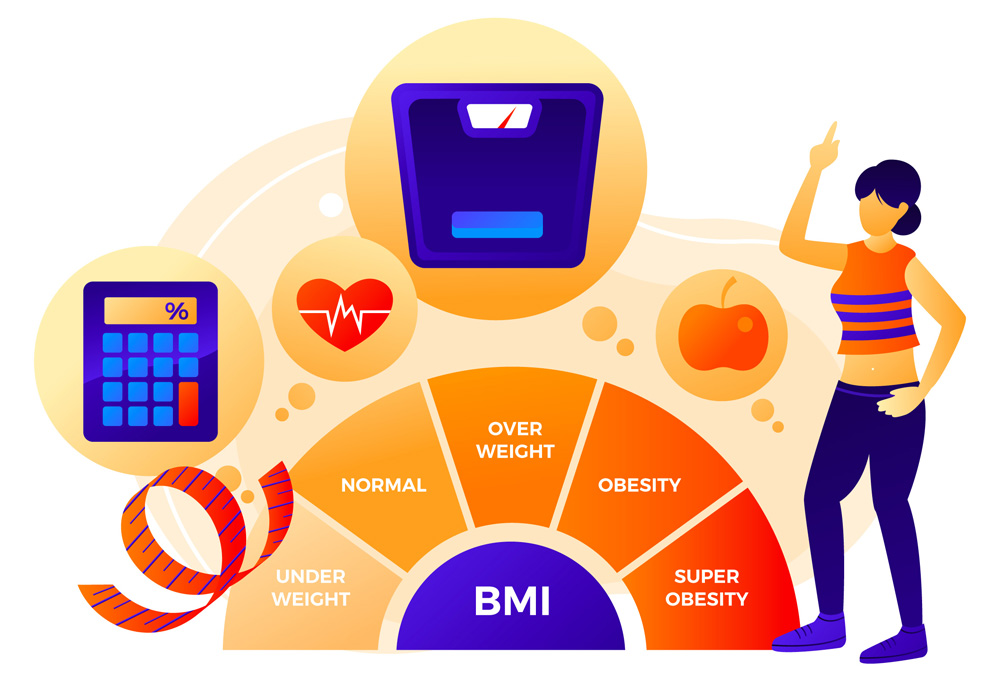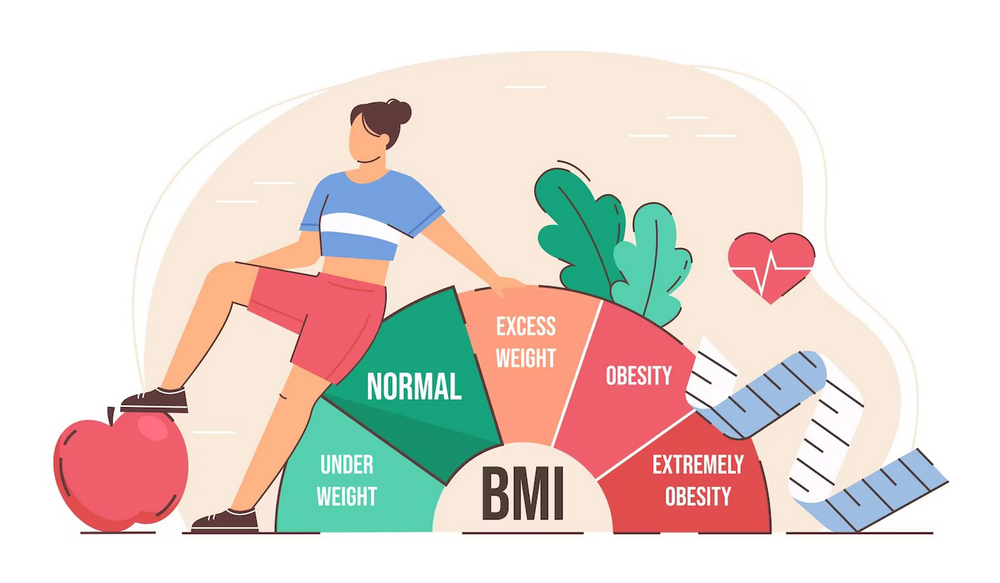Healthy Today, Healthier Tomorrow: Free BMI Calculation
In the modern world, where health and wellness take center stage, understanding your body’s composition is crucial. One of the simplest and most effective tools for assessing your health is the Body Mass Index (BMI). And what’s even better? You can now easily check your BMI online, allowing you to keep track of your health and make informed decisions about your well-being.
BMI table based on the World Health Organization’s (WHO) recommended body weight categories for adults aged 20 or older. Please note that these categories apply to both men and women:
| BMI Category | BMI Range |
|---|---|
| Underweight | Below 18.5 |
| Normal Weight | 18.5 – 24.9 |
| Overweight | 25.0 – 29.9 |
| Obesity Class I | 30.0 – 34.9 |
| Obesity Class II | 35.0 – 39.9 |
| Obesity Class III | 40.0 and above |
Keep in mind that while BMI is a useful tool for assessing weight in relation to height, it does not take into account factors like muscle mass, bone density, and overall body composition. It’s always recommended to consult with a healthcare professional for a comprehensive assessment of your health.
Table of Contents
- 1 Healthy Today, Healthier Tomorrow: Free BMI Calculation
- 2 The Convenience of an Online BMI Calculator
- 3 Using the Online BMI Calculator Effectively
- 4 Understanding BMI: A Key to Your Health
- 5 Limitations of BMI as a health indicator
- 6 Next Steps After Knowing Your BMI Results
- 7 Balanced Diets for Maintaining a Healthy BMI
- 8 Exercise and Physical Activity Recommendations
- 9 Strategies for Weight Management and Setting Realistic Goals
- 10 Health Risks and BMI: Understanding the Connection
- 11 The Importance of Body Composition
- 12 Frequently Asked Questions FAQs
- 13 Additional Resources for BMI Information
The Convenience of an Online BMI Calculator
Having an online BMI calculator at your fingertips offers several advantages:
- Instant Results –Using an online BMI calculator, you can quickly determine your BMI without any complex calculations. Just input your height and weight, and the calculator does the rest, giving you instant results.
- Easy Accessibility –With online calculators, there’s no need to install any software or download apps. You can access them from any device with internet connectivity, making it incredibly convenient for daily use.
- Track Your Progress –If you’re on a health journey, monitoring changes in your BMI is essential. Online calculators allow you to track your progress over time, helping you set achievable goals and make necessary adjustments to your lifestyle.
- Health Awareness –Being aware of your BMI can motivate you to make healthier choices. Whether you’re looking to lose weight, gain muscle, or simply maintain a healthy lifestyle, your BMI is a useful metric to guide your efforts.
- Shareable Results –Online BMI calculators often provide easy-to-share results, which can be beneficial if you’re discussing your health with a healthcare professional, fitness trainer, or even friends who are on a similar journey.
Using the Online BMI Calculator Effectively
While the online BMI calculator is a fantastic tool, it’s essential to interpret the results in context:
- Consult a Professional –If you have concerns about your BMI or are making significant lifestyle changes, it’s always wise to consult a healthcare professional who can provide personalized guidance.
- Consider Other Factors –BMI doesn’t account for other essential factors such as muscle mass, bone density, and overall body composition. Someone with a higher muscle mass may have a higher BMI, but that doesn’t necessarily mean they’re unhealthy.
- Use It as a Starting Point –Think of your BMI as a starting point for understanding your health. It’s one piece of the puzzle, but not the only factor to consider.
BMI calculator Online is a valuable tool for anyone interested in maintaining or improving their health. It’s easy to use, accessible and provides instant results. Just remember to use the results as a guide, not as a definitive measure of your overall health. When combined with other health assessments and professional advice, your BMI can be a powerful tool on your wellness journey. So why wait? Start using an online BMI calculator today and take another step towards a healthier you!
Understanding BMI: A Key to Your Health
In the quest for a healthy and balanced lifestyle, it’s essential to understand the tools that help us assess our well-being. One such tool that you’ve likely heard about is BMI, short for Body Mass Index. This simple yet powerful metric provides valuable insights into our weight relative to our height. So, let’s dive into the world of BMI and explore what it entails.
What is BMI?
BMI is a numerical value that helps us determine whether our weight is within a healthy range for our height. It’s a standardized method used by healthcare professionals and individuals alike to assess potential health risks related to weight. While it doesn’t directly measure body fat, BMI serves as a starting point in understanding how our weight impacts our overall health.
How is BMI calculated? The calculation of BMI is straightforward. It involves two primary factors: your weight and your height. Here’s the formula:
BMI = weight (kg) / (height (m))^2
It’s important to note that you’ll need to measure your weight in kilograms and your height in meters. If you’re more familiar with pounds and inches, there are many online converters that can help you make the conversion to the metric system.

BMI categories and their meanings: BMI results are divided into several categories, each with its own meaning in terms of weight classification. Here’s an overview:
- Underweight: A BMI below 18.5 falls into the underweight category. This suggests that your weight may be lower than what’s considered healthy for your height.
- Normal weight: If your BMI is between 18.5 and 24.9, you fall into the normal weight category. Congratulations! This indicates that your weight is within a healthy range relative to your height.
- Overweight: A BMI between 25 and 29.9 classifies as overweight. This suggests that your weight may pose some health risks, and it’s essential to monitor and take appropriate actions.
- Obese: A BMI of 30 or higher falls into the obese category. This indicates a higher level of health risk due to excess weight.
Limitations of BMI as a health indicator
While BMI is a valuable tool, it has its limitations. It doesn’t consider various factors that influence health, such as muscle mass, bone density, and overall body composition. Consequently, individuals with high muscle mass, such as athletes, might have a higher BMI without being unhealthy. Likewise, older adults may have a healthy BMI but still face health risks due to factors unrelated to weight.
Understanding these limitations helps us use BMI as part of a broader picture of health. It’s a useful starting point, but it’s essential to interpret the results within the context of your unique circumstances.
In our quest for health, understanding BMI is a valuable step. It gives us insights into our weight in relation to our height, helping us make informed decisions about our well-being. However, it’s crucial to remember that BMI is just one piece of the puzzle. It’s a tool that, when used wisely, can empower us to take charge of our health and make meaningful changes.
Next Steps After Knowing Your BMI Results
Now that you have calculated your Body Mass Index (BMI), you’ve taken an important step towards understanding your weight in relation to your height. Your BMI provides valuable insights into your health, and the information it offers can guide you towards making informed decisions for a healthier future. In this blog post, we’ll explore the next steps you can take after knowing your BMI results to prioritize your well-being.
1. Interpret Your BMI Category
Start by interpreting your BMI category. Determine whether you fall under the “Underweight,” “Normal Weight,” “Overweight,” or “Obesity” range. This categorization serves as a starting point for understanding your weight status and potential health risks associated with it.
2. Consult a Healthcare Professional
If your BMI falls outside the “Normal Weight” range, consider scheduling a visit with a healthcare professional. A doctor, registered dietitian, or nutritionist can provide personalized guidance based on your BMI, medical history, lifestyle, and other factors. They can help you set realistic goals and create a tailored plan to achieve and maintain a healthier weight.
3. Set Realistic Goals
Based on your BMI and professional advice, set achievable health and weight goals. These goals might include losing or gaining weight, improving muscle mass, reducing body fat percentage, or simply adopting a healthier lifestyle.
4. Focus on Balanced Nutrition
Regardless of your BMI category, nutrition plays a vital role in your well-being. If you’re looking to manage your weight, focus on balanced meals that include a variety of nutrients. Aim for whole grains, lean proteins, healthy fats, and plenty of fruits and vegetables. Consult a dietitian to create a personalized meal plan that aligns with your goals.
5. Incorporate Physical Activity
Physical activity is essential for overall health, regardless of your BMI. Engage in regular exercise that you enjoy, whether it’s walking, swimming, cycling, or participating in group classes. Aim for a combination of cardiovascular workouts, strength training, and flexibility exercises.
6. Avoid Extreme Measures
If your BMI indicates that you’re not within the “Normal Weight” range, avoid extreme dieting or drastic changes without professional guidance. Crash diets and extreme restrictions can be harmful to your health and often result in short-term gains followed by rebound weight gain.
7. Monitor Progress
Keep track of your progress over time. Regularly monitor your weight, body measurements, and how you’re feeling both physically and mentally. Celebrate small victories and stay motivated on your journey towards better health.
8. Embrace a Positive Mindset
Remember that health is a holistic concept that encompasses physical, mental, and emotional well-being. Embrace a positive mindset and focus on progress rather than perfection. Cultivate self-compassion and practice healthy habits out of self-care, not self-criticism.
Knowing your BMI results is a stepping stone towards a healthier future. It empowers you to make informed decisions about your lifestyle, nutrition, and overall well-being. By consulting professionals, setting realistic goals, adopting balanced habits, and prioritizing your health, you’re embarking on a journey towards a happier, more fulfilling life. Your BMI is a tool, but your choices and actions determine the path to a healthier you.
Balanced Diets for Maintaining a Healthy BMI
A balanced diet is the foundation of a healthy life. It provides our bodies with the essential nutrients needed to function optimally. When it comes to maintaining a healthy Body Mass Index (BMI), a balanced diet is key. Here’s what you need to know:

- Variety is Vital –Include a wide range of foods from all food groups: fruits, vegetables, whole grains, lean proteins, and healthy fats. Each group offers unique nutrients that contribute to your overall health.
- Portion Control –Pay attention to portion sizes. Overeating, even healthy foods, can lead to weight gain. Listen to your body’s hunger and fullness cues.
- Stay Hydrated –Drink plenty of water throughout the day. Proper hydration supports metabolism, helps control appetite, and promotes overall well-being.
- Limit Processed Foods –Minimize the consumption of highly processed foods, which tend to be high in added sugars, unhealthy fats, and sodium.
Exercise and Physical Activity Recommendations
Regular physical activity is crucial for maintaining a healthy weight, improving cardiovascular health, boosting mood, and increasing overall energy levels. Here’s how to get moving:
- Find What You Love –Whether it’s dancing, jogging, swimming, or playing a sport, find an activity you enjoy. This increases the likelihood that you’ll stick with it.
- Consistency Matters –Aim for at least 150 minutes of moderate-intensity aerobic activity or 75 minutes of vigorous-intensity activity every week, along with muscle-strengthening exercises on two or more days.
- Mix It Up –Incorporate a variety of exercises to work different muscle groups and prevent boredom. This could include cardio, strength training, flexibility exercises, and even relaxation techniques like yoga.
Strategies for Weight Management and Setting Realistic Goals
Healthy weight management is not about extreme diets or drastic measures. It’s about finding sustainable, lifelong habits that work for you. Here are some strategies:

- Set Realistic Goals –Focus on gradual, achievable goals. Small, consistent changes over time yield significant results.
- Mindful Eating –Pay attention to what you eat, savor your meals, and listen to your body’s hunger and fullness cues.
- Get Support –Whether it’s a friend, a family member, or a healthcare professional, having a support system can make a world of difference in your journey towards a healthy weight.
- Stay Positive –Be kind to yourself. There will be ups and downs, but maintaining a positive mindset is essential. Remember, it’s about progress, not perfection.
A healthy lifestyle isn’t a destination; it’s an ongoing journey. Embrace it with patience, determination, and a commitment to nurturing your body and mind. By making balanced dietary choices, staying active, and implementing effective strategies, you’re taking the steps to live your best, healthiest life.
Health Risks and BMI: Understanding the Connection
Your health is a precious asset, and being aware of the factors that can impact it is a vital step in taking control of your well-being. One significant tool in this journey is BMI, or Body Mass Index. This numerical value, calculated from your weight and height, serves as a marker of your weight in relation to your height. While it’s not a direct measure of health, understanding the link between BMI and certain health risks can empower you to make informed choices. Let’s explore this connection in more detail.
The Link Between BMI and Health Risks
BMI is often used as a general indicator of whether an individual’s weight falls within a healthy range. It can be a useful initial assessment, providing insights into potential health risks that can be associated with being underweight, normal weight, overweight, or obese. However, it’s crucial to recognize that BMI is not a definitive diagnostic tool but rather a starting point for further evaluation.
Health Risks Associated with Low BMI
- Nutritional Deficiencies: Being underweight can indicate insufficient nutrient intake, which may lead to deficiencies in essential vitamins and minerals, weakening the immune system and impacting overall health.
- Bone Health: Low BMI can be a risk factor for weakened bones, increasing the likelihood of fractures and osteoporosis.
- Reproductive Health: Women with low BMI may experience irregular menstrual cycles, fertility issues, and complications during pregnancy.
Health Risks Associated with High BMI (Overweight and Obesity)
- Cardiovascular Disease: Higher BMI is often associated with a greater risk of heart disease, high blood pressure, and stroke. Excess weight can strain the heart and lead to these serious conditions.
- Type 2 Diabetes: Obesity is a significant risk factor for developing type 2 diabetes, as it can lead to insulin resistance and disrupt the body’s ability to regulate blood sugar.
- Joint Problems: Excessive weight puts additional stress on joints, increasing the likelihood of conditions like arthritis and joint pain.
- Respiratory Issues: Obesity can lead to breathing problems, including sleep apnea and decreased lung function.
The Importance of Body Composition
It’s essential to recognize that BMI does not differentiate between weight from fat and weight from muscle. Individuals with high muscle mass may have a higher BMI, which doesn’t necessarily indicate poor health. This emphasizes the significance of considering body composition, not just the number on the scale.

Using BMI Wisely
While understanding the potential health risks associated with BMI is crucial, it’s equally important to use this information wisely:
- Consult a Healthcare Professional: If your BMI falls outside the healthy range, it’s essential to consult with a healthcare provider who can provide a comprehensive evaluation of your health.
- Focus on Lifestyle: Regardless of your BMI, adopting a healthy lifestyle with balanced nutrition and regular physical activity is key to overall well-being.
- Remember Individual Variability: Health is influenced by numerous factors beyond BMI, including genetics, age, and overall fitness.
In conclusion, BMI can provide valuable insights into potential health risks, but it should be considered as part of a more comprehensive assessment. By understanding the connection between BMI and health risks and seeking professional guidance, you can take proactive steps to prioritize your health and well-being.
Frequently Asked Questions FAQs
![]()
What is BMI, and why is it important?
BMI stands for Body Mass Index, and it’s a numerical value calculated from a person’s weight and height. It’s used as a general indicator of whether a person’s weight falls within a healthy range relative to their height. While it’s not a direct measure of body fat, it’s a useful tool for assessing potential health risks related to weight.
How is BMI calculated?
The BMI formula is simple: BMI = weight (kg) / (height (m))^2. However, for online convenience, you can find numerous BMI calculators that do the math for you. You input your weight and height, and the calculator provides your BMI value.
What is a healthy BMI range?
BMI categories are often classified as follows:
- Underweight: BMI less than 18.5
- Normal weight: BMI 18.5 – 24.9
- Overweight: BMI 25 – 29.9
- Obese: BMI 30 or higher
It’s important to note that while these categories are useful for general guidance, individual health can vary based on factors such as muscle mass, age, and overall health.
Is BMI an accurate measure of health?
BMI has its limitations. It doesn’t distinguish between weight from fat and weight from muscle, so very muscular individuals might have a high BMI despite being in excellent health. Conversely, some people with a “normal” BMI might still have health risks if their body composition is unhealthy.
Can BMI be used for children and teens?
Yes, but the interpretation of BMI for children and teens is different due to their changing growth patterns. Pediatric BMI calculations take into account age and sex, and a child’s BMI is often compared to growth charts to determine if they’re within a healthy range.
How can I calculate my BMI online?
There are many reputable online BMI calculators available. Simply search for “BMI calculator” in your preferred search engine, input your weight and height, and the calculator will provide your BMI value along with its interpretation.
What should I do if my BMI is outside the healthy range?
If your BMI is outside the healthy range, it’s a good idea to consult with a healthcare professional. They can help you understand the context of your BMI, assess your overall health, and provide personalized recommendations based on your individual circumstances. It might involve changes in diet, exercise, or other lifestyle adjustments tailored to your needs.
Additional Resources for BMI Information
For more information on BMI and its significance for your health, consider exploring the following reputable sources:


